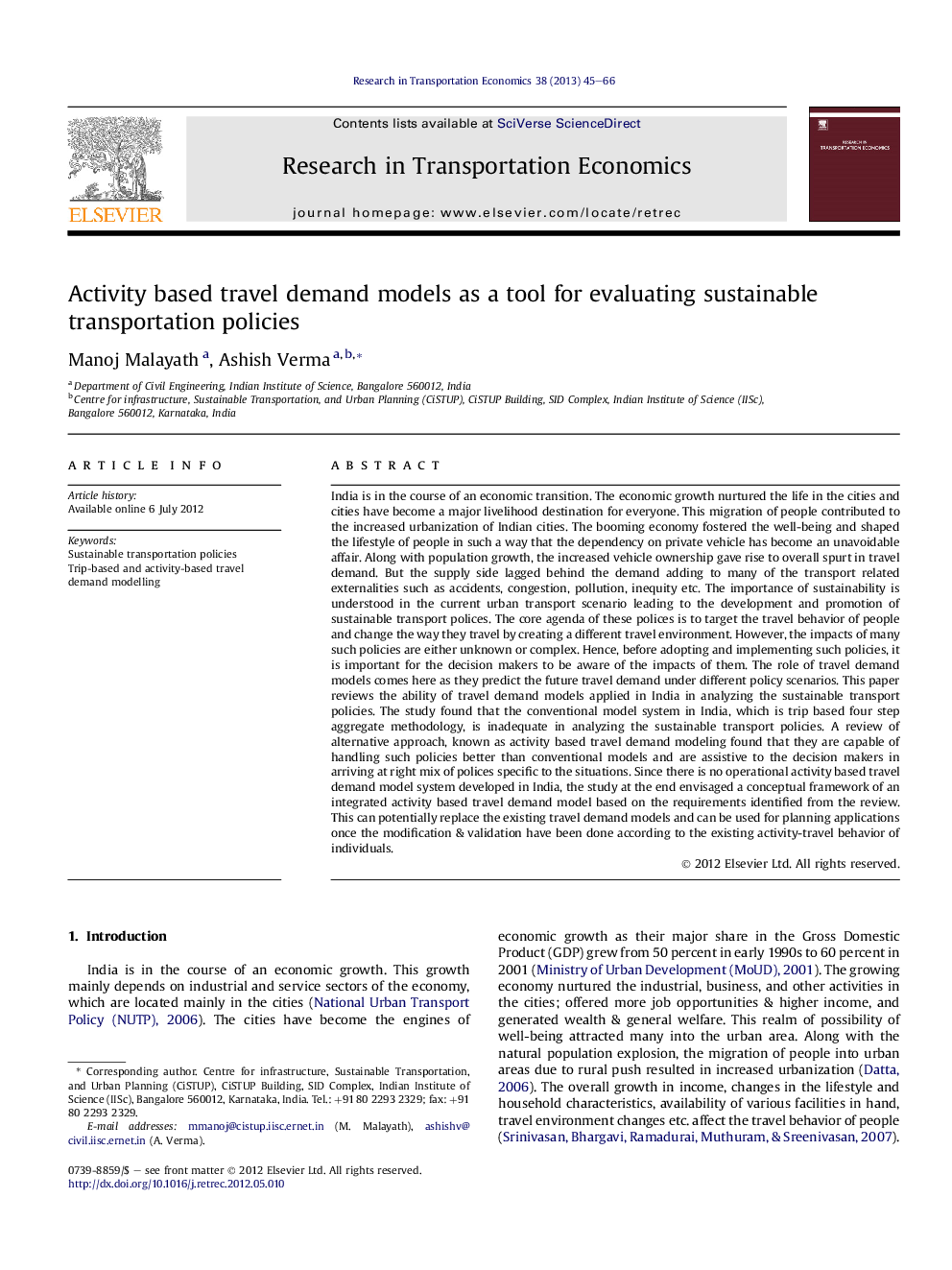| کد مقاله | کد نشریه | سال انتشار | مقاله انگلیسی | نسخه تمام متن |
|---|---|---|---|---|
| 7386270 | 1480629 | 2013 | 22 صفحه PDF | دانلود رایگان |
عنوان انگلیسی مقاله ISI
Activity based travel demand models as a tool for evaluating sustainable transportation policies
ترجمه فارسی عنوان
مدل های تقاضای سفر مبتنی بر فعالیت به عنوان ابزار برای ارزیابی سیاست های حمل و نقل پایدار
دانلود مقاله + سفارش ترجمه
دانلود مقاله ISI انگلیسی
رایگان برای ایرانیان
کلمات کلیدی
سیاست های حمل و نقل پایدار، مدل سازی تقاضای مسافرت مبتنی بر سفر و فعالیت،
ترجمه چکیده
هند در جریان گذار اقتصادی است. رشد اقتصادی، زندگی را در شهرها تقویت کرد و شهرها به عنوان یک منبع معیشتی برای همه تبدیل شده اند. این مهاجرت مردم به افزایش شهرنشینی شهرهای هند کمک کرد. اقتصاد پررونق، رفاه و آسایش را به وجود آورد و شیوه زندگی مردم را به گونه ای شکل داد که وابستگی به وسیله نقلیه خصوصی به یک امر اجتناب ناپذیر تبدیل شده بود. همراه با رشد جمعیت، افزایش دارایی های وسیله نقلیه موجب افزایش کلی در تقاضای سفر شد. اما طرف عرضه در پشت تقاضا افزوده شده به بسیاری از اثرات خارجی مرتبط با حمل و نقل مانند حوادث، احتقان، آلودگی، بی عدالتی و غیره عقب مانده است. اهمیت پایداری در سناریو فعلی حمل و نقل شهری منجر به توسعه و ارتقاء سیاست های حمل و نقل پایدار می شود. دستورالعمل اصلی این خط مشی ها این است که رفتار مسافرتی مردم را هدف قرار داده و مسیر ایجاد سفر محیطی متفاوت را تغییر دهند. با این حال، اثرات بسیاری از این سیاستها ناشناخته یا پیچیده است. از این رو، قبل از اتخاذ و پیاده سازی چنین سیاست هایی، تصمیم گیرندگان باید از تاثیرات آنها آگاه باشند. نقش مدل های تقاضای مسافرت در اینجا به عنوان آنها پیش بینی تقاضای سفر در آینده در سناریو های سیاست های مختلف است. در این مقاله توانایی مدل های تقاضای مسافرت در هند در تحلیل سیاست های حمل و نقل پایدار بررسی شده است. این مطالعه نشان داد که سیستم مدل متعارف در هند، که روش متداول چهار مرحله ای سفر است، در تجزیه و تحلیل سیاست های حمل و نقل پایدار ناکافی است. بازبینی رویکرد جایگزین، که به عنوان مدلسازی تقاضای سفر مبتنی بر فعالیت شناخته می شود، دریافت که آنها توانسته اند از چنین سیاست هایی بهتر از مدل های متعارف برخوردار شوند و به تصمیم گیرندگان در دستیابی به مجموعه ای مناسب از سیاست های خاص به شرایط کمک می کند. از آنجاییکه سیستم مدل تقاضای مسافرت مبتنی بر عملیات در هند توسعه نیافته است، در پایان مطالعه، یک چارچوب مفهومی از یک مدل تقاضای سفر مبتنی بر یکپارچه را بر اساس الزامات شناسایی شده از بررسی فراهم می کند. این به طور بالقوه می تواند مدل های تقاضای مسافرت موجود را جایگزین کند و می تواند برای برنامه ریزی برنامه های کاربردی مورد استفاده قرار گیرد، زمانی که اصلاحات و اعتبار سنجی بر اساس رفتار فعلی مسافرت افراد انجام شده است.
موضوعات مرتبط
علوم انسانی و اجتماعی
اقتصاد، اقتصادسنجی و امور مالی
اقتصاد و اقتصادسنجی
چکیده انگلیسی
India is in the course of an economic transition. The economic growth nurtured the life in the cities and cities have become a major livelihood destination for everyone. This migration of people contributed to the increased urbanization of Indian cities. The booming economy fostered the well-being and shaped the lifestyle of people in such a way that the dependency on private vehicle has become an unavoidable affair. Along with population growth, the increased vehicle ownership gave rise to overall spurt in travel demand. But the supply side lagged behind the demand adding to many of the transport related externalities such as accidents, congestion, pollution, inequity etc. The importance of sustainability is understood in the current urban transport scenario leading to the development and promotion of sustainable transport polices. The core agenda of these polices is to target the travel behavior of people and change the way they travel by creating a different travel environment. However, the impacts of many such policies are either unknown or complex. Hence, before adopting and implementing such policies, it is important for the decision makers to be aware of the impacts of them. The role of travel demand models comes here as they predict the future travel demand under different policy scenarios. This paper reviews the ability of travel demand models applied in India in analyzing the sustainable transport policies. The study found that the conventional model system in India, which is trip based four step aggregate methodology, is inadequate in analyzing the sustainable transport policies. A review of alternative approach, known as activity based travel demand modeling found that they are capable of handling such policies better than conventional models and are assistive to the decision makers in arriving at right mix of polices specific to the situations. Since there is no operational activity based travel demand model system developed in India, the study at the end envisaged a conceptual framework of an integrated activity based travel demand model based on the requirements identified from the review. This can potentially replace the existing travel demand models and can be used for planning applications once the modification & validation have been done according to the existing activity-travel behavior of individuals.
ناشر
Database: Elsevier - ScienceDirect (ساینس دایرکت)
Journal: Research in Transportation Economics - Volume 38, Issue 1, February 2013, Pages 45-66
Journal: Research in Transportation Economics - Volume 38, Issue 1, February 2013, Pages 45-66
نویسندگان
Manoj Malayath, Ashish Verma,
